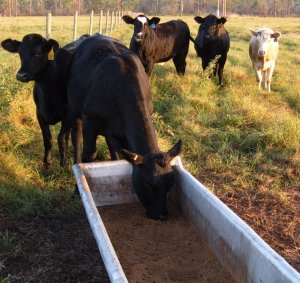Effects of supplement type on performance and reproductive efficiency of Brahman-crossbred heifers

In Florida, energy supplementation is essential for heifer development systems since tropical and subtropical perennial grasses usually lack in energy content, and energy is the primary nutritional consideration for optimum reproductive maturation and performance of beef heifers. Molasses and citrus pulp are options for supplementation. Although both feedstuffs are by-products with similar energy content, they differ in physical form and carbohydrate profile, which may impact supplement intake behavior, forage intake, diet digestibility, energy utilization, and consequent animal performance. Molasses is classified as a liquid supplement and has sucrose as the main constituent of its carbohydrate profile. Citrus pulp is classified as a dry supplement, and has pectin is its major carbohydrate.
As part of a nutrition study, we compared body weight gain and reproductive performance of sixty heifers fed three times per week with either a citrus pulp + cottonseed meal or a blackstrap molasses + cottonseed meal supplement for sixteen weeks (September to December 2004). Heifers averaged 10 months of age and 542 lbs of body weight at the beginning of the study. Both supplement provided 3.53 and 0.96 lbs of TDN and CP per heifer daily, respectively. During the experimental period, heifers were maintained in bahiagrass pastures, and offered free-choice mineral mix and water. Free-choice stargrass hay was offered when forage availability was reduced. Heifers were exposed to mature Angus bulls during the last eight weeks of the study (breeding season). Average daily gain was determined from body weights collected at the start and end of the study. Reproductive performance was evaluated by pregnancy rates at the end of breeding season and attainment of puberty, which was assessed via progesterone analysis of blood samples collected during the study.
We observed that heifers offered citrus pulp bases supplements had greater body weight gain compared to heifers offered molasses-based supplements (0.90 vs. 0.65 lbs per day, respectively). However, the superiority in performance from heifers fed with citrus pulp-based supplements was not reflected in reproductive efficiency. Both groups had similar pregnancy rates at the end of the study (60.0 vs. 57.5 % for heifers fed citrus- or molasses-based supplements, respectively), puberty attainment during the study (80.0 vs. 76.6 %, respectively), and age at puberty (379 vs. 369 days, respectively)
We concluded that offering a citrus pulp-based supplement to heifers improves body weight gain without impacting reproductive performance compared to supplements based on liquid molasses.

